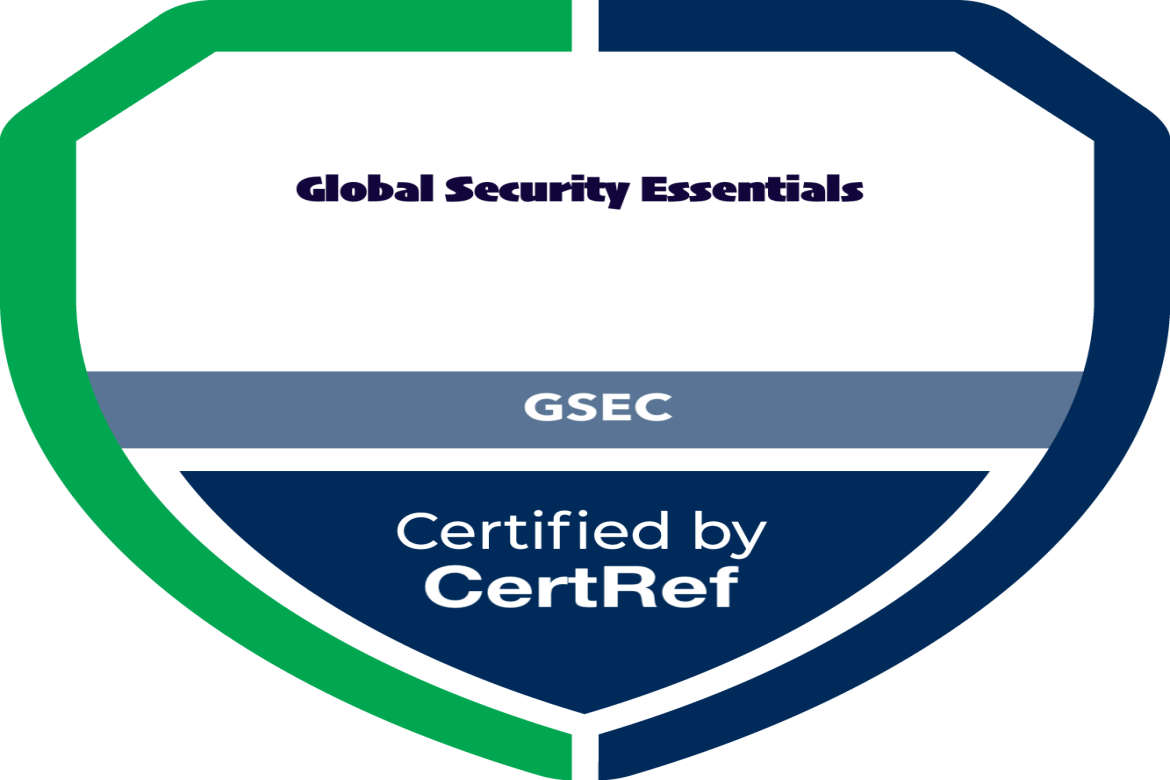Global Security Essentials
Global Security Essentials

Exam Info
Target
Security Professionals that want to demonstrate they are qualified for IT systems hands-on roles with respect to security tasks. Candidates are required to demonstrate an understanding of information security beyond simple terminology and concepts.
The topic areas for each exam part follow:
- Access Control & Password Management: The candidate will understand the fundamental theory of access control and the role of passwords in managing access control.
- Active Defense: The candidate will demonstrate a high-level understanding of what Active Defense is and the tools, methods, and techniques needed to utilize it effectively.
- Contingency Plans: The candidate will understand the critical aspect of contingency planning with a business continuity plan and disaster recovery plan
- Critical Controls: The candidate will understand the purpose, implementation, and background of the Critical Security Controls
- Cryptography: The candidate will have a basic understanding of the concepts of cryptography, including a high-level understanding of the major types of cryptosystems and steganography.
- Cryptography Algorithms & Deployment: The candidate will have a basic understand of the mathematical concepts that contribute to cryptography and identify commonly used symmetric, asymmetric, and hashing cryptosystems.
- Cryptography Application: The candidate will have a high-level understanding of the use, functionality, and operation of VPNs, GPG, and PKI
- Defense in Depth: The candidate will understand what defense in depth is and an identify the key areas of security and demonstrate the different strategies for implementing effective security within an organization.
- Defensible Network Architecture: The candidate will demonstrate how to architect a network to be monitored and controlled to resist intrusion.
- Endpoint Security :The candidate will demonstrate a basic understanding of the function and uses of endpoint security devices, such as endpoint firewalls, HIDS, and HIPS
- Enforcing Windows Security Policy: The candidate will have a high-level understanding of the features of Group Policy and working with INF security templates
- Incident Handling & Response: The candidate will understand the concepts of incident handling and the processes pertaining to incident handling.
- IT Risk Management: The candidate will understand the terminology and approaches to cyber security risk management including identification of the steps of the Threat Assessment process
- Linux Security - Structure, Permissions and Access: The candidate will demonstrate understanding of a variety of Linux operating systems, including mobile systems, to better understand how to configure and secure Linux.
- Linux Services - Hardening and Securing: The candidate will demonstrate an ability to gain visibility into a Linux system to be able to secure and harden the system.
- Linux - Monitoring and Attack Detection: The candidate will demonstrate an understanding of the use of system baselines, log files, and other tools common to Linux operating systems in order to better monitor systems for signs of attack.
- Linux - Security Utilities: The candidate will demonstrate an understanding of how to use key security utilities and tools that are available for Linux systems to enhance system security.
- Log Management & SIEM: The candidate will demonstrate a high-level understanding of the importance of logging, the setup and configuration of logging, and log analysis with the assistance of SIEMs
- Malicious Code & Exploit Mitigation: The candidate will understand important attack methods and basic defensive strategies to mitigate those threats.
- Network Device Security: The candidate will have a basic understanding of the risks of network devices and how to secure them.
- Network Security Devices: The candidate will demonstrate a basic understanding of the function and uses of network security devices, such as, firewalls, NIDS, and NIPS
- Networking & Protocols: The candidate will demonstrate an understanding of the properties and functions of network protocols and network protocol stacks.
- Securing Windows Network Services: The candidate will know how to take basic measures in securing Windows network services such as IPSec, IIS, and Remote Desktop Services
- Security Policy: The candidate will understand the purpose and components of policy.
- Threat Hunting: The candidate will be able enumerate methods of threat hunting, use tools for threat hunting and be able to lessen the impact and damage through earlier detection of adversaries.
- Virtualization and Cloud Security: The candidate will have a basic understanding of the risks of virtualization and cloud services and how to secure them.
- Vulnerability Scanning and Penetration Testing: The candidate will demonstrate an understanding of the concepts and relationship behind reconnaissance, resource protection, risks, threats, and vulnerabilities including preliminary abilities to create network maps and perform penetration testing techniques
- Web Communication Security: The candidate will demonstrate an understanding of web application security and common vulnerabilities including CGI, cookies, SSL and active content.
- Windows Access Controls: The candidate will understand how permissions are applied in the Windows NT File System, Shared Folders, Printers, Registry Keys, and Active Directory, and how Privileges are applied
- Windows as a Service: The candidate will understand how to manage updates for a network of Windows hosts.
Windows Automation, Auditing, and Forensics: The candidate will be introduced to the techniques and technologies used to audit Windows hosts. - Windows Security Infrastructure: The candidate will identify the differences between types of Windows OSes and how Windows manages groups and accounts, locally and with Active Directory and Group Policy
- Wireless Network Security: The candidate will have a basic understanding of the misconceptions and risks of wireless networks and how to secure them.
Exam Skills
Certification Exam: Global Security Essentials
| Exam Type | Certification |
|---|---|
| Exam Code | GSEC |
| Duration | 5 hours |
| Number Of Question | 180 |
| Success Score | 73% |
| Price | 150$ |
Evaluation Exam: Global Security Essentials
| Exam Type | Evaluation |
|---|---|
| Exam Code | GSEC-eval |
| Duration | 1 hour |
| Number Of Question | 30 |
| Success Score | 73% |
| Price | 40$ |
